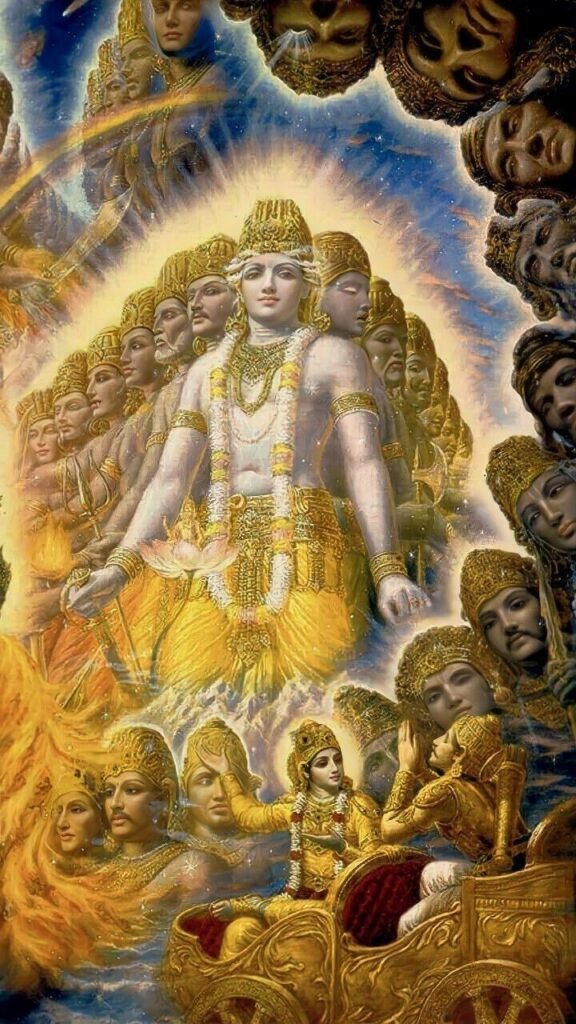ॐ त्रयम्बकं यजामहे सुगन्धिं पुष्टिवर्धनम् ।
उर्वारुकमिव बन्धनान्मृ त्योर्मुक्षीय मामृतात् ॥
Translation
Om Try-Ambakam Yajaamahe Sugandhim Pusstti-Vardhanam |
Urvaarukam-Iva Bandhanaan Mrtyor-Mukssiiya Maa-[A]mrtaat ||
Hindi Meaning
हम त्रिनेत्र को पूजते हैं,
जो सुगंधित हैं, हमारा पोषण करते हैं,
जिस तरह फल, शाखा के बंधन से मुक्त हो जाता है,
वैसे ही हम भी मृत्यु और नश्वरता से मुक्त हो जाएं।
English Meaning
We worship the three-eyed One, who is fragrant and who nourishes all. Like the fruit falls off from the bondage of the stem,
may we be liberated from death, from mortality.

BG 4.8:
परित्राणाय साधूनां विनाशाय च दुष्कृताम् |
धर्मसंस्थापनार्थाय सम्भवामि युगे युगे || 8||
paritrāṇāya sādhūnāṁ vināśhāya cha duṣhkṛitām
dharma-sansthāpanārthāya sambhavāmi yuge yuge
To protect the righteous, to annihilate the wicked, and to reestablish the principles of dharma I appear on this earth, age after age.
Having stated in the last verse that God descends in the world, he now states the three reasons for doing so: 1) To annihilate the wicked. 2) To protect the pious. 3) To establish dharma. However, if we closely study these three points, none of the three reasons seem very convincing:
To protect the righteous. God is seated in the hearts of his devotees, and always protects them from within. There is no need to take an Avatar for this purpose.
To annihilate the wicked. God is all-powerful, and can kill the wicked merely by wishing it. Why should he have to take an Avatar to accomplish this?
To establish dharma. Dharma is eternally described in the Vedas. God can reestablish it through a Saint; he does not need to descend himself, in his personal form, to accomplish this.
How then do we make sense of the reasons that have been stated in this verse? Let’s delve a little deeper to grasp the import of what Shree Krishna is stating.
The biggest dharma that the soul can engage in is devotion to God. That is what God strengthens by taking an Avatār. When God descends in the world, he reveals his divine forms, names, virtues, pastimes, abodes, and associates. This provides the souls with an easy basis for devotion. Since the mind needs a form to focus upon and to connect with, the formless aspect of God is very difficult to worship. On the other hand, devotion to the personal form of God is easy for people to comprehend, simple to perform, and sweet to engage in.
Thus, since the descension of Lord Krishna 5,000 years ago, billions of souls have made his divine leelas (pastimes) as the basis of their devotion, and purified their minds with ease and joy. Similarly, the Ramayan has provided the souls with a popular basis for devotion for innumerable centuries. When the TV show, Ramayan, first began airing on Indian national television on Sunday mornings, all the streets of India would become empty. The pastimes of Lord Ram held such fascination for the people that they would be glued to their television sets to see the leelas on the screen. This reveals how Lord Ram’s descension provided the basis for devotion to billions of souls in history. The Ramayan says:
rām eka tāpasa tiya tārī, nāma koṭi khala kumati sudhārī [v7]
“In his descension period, Lord Ram helped only one Ahalya (Sage Gautam’s wife, whom Lord Ram released from the body of stone). However, since then, by chanting the divine name “Ram,” billions of fallen souls have elevated themselves.” So a deeper understanding of this verse is:
To establish dharma: God descends to establish the dharma of devotion by providing souls with his names, forms, pastimes, virtues, abodes, and associates, with the help of which they may engage in bhakti and purify their minds.
To kill the wicked: Along with God, to help facilitate his divine pastimes, some liberated Saints descend and pretend to be miscreants. For example, Ravan and Kumbhakarna were Jaya and Vijaya who descended from the divine abode of God. They pretended to be demons and opposed and fought with Ram. They could not have been killed by anyone else, since they were divine personalities. So, God slayed such demons as a part of his leelas. And having killed them, he sent them to his divine abode, since that was where they came from in the first place.
To protect the righteous: Many souls had become sufficiently elevated in their sādhanā (spiritual practice) to qualify to meet God face-to-face. When Shree Krishna descended in the world, these eligible souls got their first opportunity to participate in God’s divine pastimes. For example, some gopīs (cowherd women of Vrindavan, where Shree Krishna manifested his pastimes) were liberated souls who had descended from the divine abode to assist in Shree Krishna’s leelas. Other gopīs were materially bound souls who got their first chance to meet and serve God, and participate in his leelas. So when Shree Krishna descended in the world, such qualified souls got the opportunity to perfect their devotion by directly participating in the pastimes of God.
This is the deeper meaning of the verse. However, it is not wrong if someone wishes to cognize the verse more literally or metaphorically.